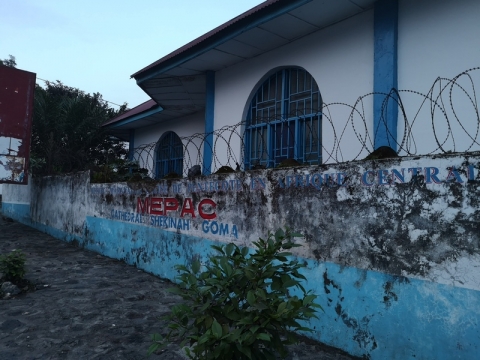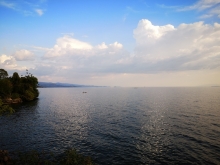Good Friday in the Congo

It’s Good Friday, the day when Christians follow Jesus down the Via Dolorosa, the way of suffering. Pilgrims in Jerusalem physically retrace Jesus’ steps from the place of his judgement to his crucifixion, and believers around the world retrace Jesus’ last steps through the Stations of the Cross. Figuratively, we can all follow him more closely by reflecting on Jesus’ sacrifice in our hearts. That is how I am walking the Via Dolorosa in today the Democratic Republic of the Congo.
In Canada, it frequently rains on Good Friday. I imagine it’s the sky crying tears for Jesus, and the sins he died to overcome. Although it is the rainy season in Goma, no celestial tears are falling, but an unusually cold wind is blowing. May it cleanse us from the oppression of solar and human crucibles.
Leading me on today’s procession is the daily prayer podcast, Pray as you Go. With the beautiful introduction of Miserere Mei, Deus, sung by the choir of St. Sepulchre’s, London, I soften my focus on my physical surroundings, and deepen my gaze on spiritual realities. Jesus’ eyes were wide open to his imminent crucifixion before his arrest in the garden of Gethsemane, but his disciples’ eyes were heavy with sleep. How often I delay my own prayers until I am weary rather than wide eyed. It is so much more enriching to pray during the day, as I am today. I am beginning renew my practice to “withdraw to a lonely place” as Jesus often did, to pray at lunch or after work. It helps me keep the spiritual focus I need to live more meaningfully and lovingly.From the garden of Gethsemane, we follow Jesus on his steadfast, intentional march to his death. He was not a powerless political victim; on the contrary, he offered himself as a mysterious, redemptive sacrifice (John 10:18). Somehow, through the power of God, Jesus’ resurrection gave humans eternal life, and the strength to live this life with integrity (John 14:12, 19).
In contrast to Jesus, there are many powerless political victims in the Congo; 4.5 million of them, according to the United Nations Refugee Agency, UNHCR. They are victims of government oppression or inaction, or over one hundred armed militias with defensive or offensive aims. They often recruit child soldiers, kidnap and violate girls, and take innocent lives. Lives that are not directly destroyed become precarious when people fleeing the fighting lose their homes and livelihoods. Their deaths are destructive, not redemptive. For them, I pray to God for justice, protection, and daily bread. If humanitarian agencies didn’t feed them, millions of them would die.
Pray to God for justice, protection, and daily bread for the millions of powerless political victims in the Democratic Republic of the Congo. If humanitarian agencies didn’t feed them, millions of them would die.
The path to life for over 89 million Congolese is not through military power, but through the power of dialogue and justice. Defending the victims can be costly, even fatal, and the enemies of peace are powerful. Those who resolutely defend human rights in the Congo follow Jesus in his redemptive path of healing the sick and proclaiming freedom to the captives (Luke 4:18-21). May God redeem their sacrifices with political change and justice. May God change the battles from swords to words. To fight for peace, use must use peaceful means. We cannot use guns to establish peace. Let’s be soldiers in the army of love, and let our weapons be love, truth, justice, mercy, and money. Humanitarian agencies cannot deploy peacebuilders or distribute rations without money.
May God change the battles from swords to words, and let our weapons be love, truth, justice, mercy, and money. Humanitarian agencies cannot deploy peacebuilders or distribute rations without money.
When Jesus was raised to his only throne, a cross, wearing his only crown, made of thorns, soldiers cast lots for his only possessions, his clothing. If Jesus lived in the Congo, he’d be a refugee, not an aid worker, walking on foot, not driving an SUV. In fact, Jesus said riches made it virtually impossible to enter the kingdom of God (Luke 18:22-25).
When preparing to come to the Congo I read Jesus’ words, “there are some of those standing here who will not taste death until they see the kingdom of God” (Luke 9:27). Did those first century listeners indeed see the kingdom of God on earth? If so, it certainly wasn’t an obvious, ordinary kingdom. Almost every one of Jesus’ twelve disciples were martyred, and Christians were persecuted for the next three centuries. Nor does it look like God’s kingdom on earth has been established in the primarily Christian country of the Congo. How, then, can we interpret Jesus’ words as true? The way I understand it is through beachheads of peace within territories of war. Since the beginning of creation, the Bible speaks of two spiritual kingdoms on earth – the kingdom of God, ruled by love, and the kingdom of Satan, ruled by hate. Jesus himself was tempted by the devil, who had the power to grant him earthly power (Luke 4:5-8). Thank God, Jesus resisted and persevered in establishing the kingdom of God, which will overcome the power of evil (Ephesians 1:18-21). God urges us to join him in establishing heavenly communities on earth (1 Corinthians 5:17-21). As Jesus taught us to pray, "Thy kingdome come, thy will be done on earth, as it is in heaven (Matthew 6:10).
On further reflection, the followers of Jesus did live to see the kingdom of God established on earth. In contrast to the rich ruler who couldn’t bring himself to sell his possessions to follow Christ, just after Jesus’ death his followers sold their property and held goods in common so that everyone’s needs were met (Acts 2:44-47). That’s how the kingdom of God is established on earth – in sharing everything, not building walls to keep out the poor.
In contrast to the rich ruler who couldn’t bring himself to sell his possessions to follow Christ, the first century Christians sold their property or held in common so that everyone’s needs were met (Acts 2:44-47). That’s how the kingdom of God is established on earth – by sharing everything, not building walls to keep out the poor.
Although I professed allegiance to God’s kingdom in childhood, and have been seeking to live by godly principles all of my life, I still struggle with “dual citizenship” – the desire to live up to the radical self-sacrifice that the suffering of others demands, versus a self-centred life of personal comfort. Even as an emergency communicator in the Congo, I live a privileged lifestyle while serving people who have lost everything. How much should I save for myself; how much should I spend on the poor? Regardless of geography, everyone with worldly goods and a moral conscience must ask themselves the same question. Our awareness is global, and our finances can go global. Sometimes, our bodies follow as well.
I pray that this year opens my eyes more widely to Kingdom principles and values. I pray that I will see the spiritual riches of those who have lost everything, and fear the loss of my possessions less. I pray that God will make the delicacies of oppressors taste like the blood of the people they destroy. I pray defenders of the powerless will grow in the conviction and hope that nonviolent protest is morally and strategically more powerful than armed resistance. And I pray that God will move the Congo quickly from the sorrow of Good Friday to the resurrection of Easter. Amen.

